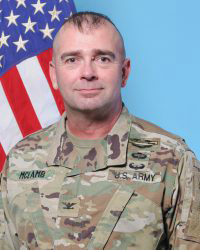My dad was born one of ten children. He was raised primarily by his mother, who frequently acted as a single parent during the extended absences of his somewhat unreliable father. He grew up in a poor family in one of the poorest rural areas of Alabama, dropping out of school as a teenager and taking a series of manual labor jobs in order to contribute to the family’s welfare. In 1965, he enlisted in the United States Army with an eighth grade education and no marketable skills. He took one of the few jobs available; he became a combat infantryman.

Col. Joseph McLamb
Over the next three decades, he served two combat tours in Vietnam and multiple peace-time tours in the Republic of Korea. He went to night school and passed the GED. After several years in the infantry, he gained the skills needed to qualify as an aircraft mechanic. Convinced of the importance of education, over a period of years he earned an Associate’s Degree. He attained the rank of command sergeant major, the highest enlisted rank, before retiring in 1993.
Along the way – and with the assistance of my mother, an extraordinary woman who moved every two years, worked an endless series of entry-level jobs to supplement our Army income, and kept the family in tact while my father was deployed for weeks or months at a time – my dad embedded in his children a handful of key values:
- Loyalty to the nation, and a deep sense of gratitude for being fortunate enough to be born a citizen of the greatest nation on the planet
- The need to unfailingly do one’s own duty, whether those around you are doing theirs or not
- A commitment to treating all people – even your enemies – with dignity and respect
- A life of selfless service, placing the needs of others ahead of your own
- Maintaining one’s honor under all circumstances
- Living a life of integrity, doing the harder right rather than the easier wrong, even – or maybe especially – when no one is looking
- Demonstrating personal courage in the face of both physical and moral danger
These were the family values my father and mother taught me, and if I have ever failed to live up to them I have only myself to blame. My parents raised me right. And when I, at age 18, in turn joined the Army, I soon discovered these values to be the Army’s values as well.
For my family, the US Army offered opportunities that could be found nowhere else. In only two generations we have gone from a manual laborer with an eighth-grade education to a colonel with three masters degrees. We’ve lived across the United States from California to South Carolina, from New York to Texas. We have served in foreign countries in Asia, Central America, Europe, the Middle East, and Africa. It is almost impossible for me to imagine how different my life – and the life of my children – would be today if my father had been turned away by the Army back in 1965.
I do not want to paint an unrealistically rosy picture, however. Military life is not for everyone. The Army exists to fight and win America’s wars, and a life spent in the Army is necessarily a life of sacrifice and, at times, danger. And the Army makes no allowances for the circumstances into which you were born – everyone is expected to meet Army standards, even under the duress of combat. Those who do are retained and promoted; those who do not are thanked for their service and separated. It is a way of life that places great stress on Soldiers and families alike.
But it is an honorable and valuable way of life, and those who have the determination and grit to make the team find themselves part of something that is personally fulfilling in a way that very few things are. The Army offers opportunities that, frankly, can be found in few other professions. Just as in 1965, today’s Army is a place where disadvantaged youngsters can build a foundation for a lifetime of success and significance – whether they remain in the Army for two years or twenty.
Unlike in 1965, however, today’s Army is an all-Volunteer force, and the minimum standards for enlistment are much higher than when my father joined. Obesity, drug convictions, and the absence of a high school education disqualify the majority of today’s youth from military service.
I have served in the Army for 30 years now, and like my father before me, I am a combat infantryman. I have fought in Iraq and Afghanistan, have missed holidays and birthdays, have lost Soldiers in combat. I have experienced both the amazing opportunities and the painful sacrifices inherent in military service for the republic that Abraham Lincoln called man’s “last, best hope.” And if I had my life to live over again, I would do three things the same. I would serve the same God; I would marry the same amazing lady; and I would join the United States Army.












I’ve never met Col. Joseph McLamb nor do I know anything about him other than what I’ve just read in his guest editorial piece “Last, Best Hope”. To that end, I say Thank Your for your service sir, & I am proud to share the same last name.
Thank you, Col. McLamb. Many youth (and adults) will benefit by following your example of choosing a path for your life and then sticking with it. Thank you also for being active locally by attending Richland 2 School Board meetings.